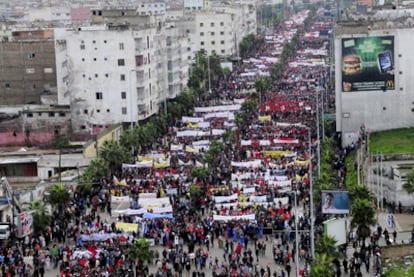Moroccans fear a PP government will harm bilateral relations
Rabat is worried that Spain will change its position on Western Sahara
Last November 28, hundreds of Moroccans ? three million according to official press estimates ? marched through Casablanca shouting the slogan: "Popular Party, enemy of Morocco."
Leading the march was Prime Minister Abbas El Fassi, the head of the Istiqlal, the nationalist party which is the largest formation in the Moroccan parliament. He was flanked by the leaders of a dozen other parties.
Only three weeks before, Moroccan security forces had forcibly evicted hundreds of Sahrawis from a protest camp outside Laâyoune, Western Sahara, which ignited an outcry across Spain, with the PP at the forefront. Rabat replied by organizing the Casablanca demonstration.
Now, the conservative Spanish party, which is much despised by many Moroccans, and its leader, Mariano Rajoy, whom El Fassi has described as "an agitator," may be on their way to govern Spain ? Morocco's second largest trading partner after France.
In the eyes of some Moroccan leaders, the PP brings back bad memories and stokes certain fears. During Prime Minister José María Aznar's administration, military tensions between the two countries were heightened when the Moroccans occupied the small islet Spain calls Perejil in July 2002. Even when Rajoy took over the PP leadership, the tensions continued when he decided to visit Melilla. The visit occurred after the enclave had briefly closed its borders to prevent African migrants from trying to enter Spanish territory.
With the Socialist government in office, however, Rabat for the most part has enjoyed a better relationship with Madrid. El Fassi traveled to the capital in 2008 to discuss joint security issues as well as the three-decade-old dispute over Western Sahara. Spain, under Zapatero, has given quiet support to Morocco's formula that would give some self-governing autonomy to the former Spanish colony, a proposal that falls well short of the pro-independence Polisario Front's demands. But relations almost came to a breaking point when King Juan Carlos and Queen Sofia paid an official visit to Melilla and its sister enclave Ceuta in 2007. In protest, King Mohamed VI recalled his ambassador for two months. Then more tensions were ignited when Morocco expelled Western Sahara activist Aminatou Haidar, who later went on a hunger strike in a Canary island airport.
Throughout the years, there has never been a direct relationship between the PP and the Moroccan royal house. Rabat's favorite go-between inside the party is Gustavo Aristegui, the party's foreign policy parliamentary spokesman who last year married a Moroccan. Leaders in Rabat, however, were surprised when Aristegui was left out of this year's congressional slates; some even interpreted it as perhaps a hostile message. There are others who hope that he will be appointed Spain's ambassador to Morocco.
The Moroccans also worry that Spain under Rajoy will change its position on Western Sahara. Their fears are based on statements made by Jorge Moragas, Rajoy's chief of staff, who told EL PAÍS in an interview in August that he disapproved of the Socialist government's veiled support for Morocco's semi-autonomous proposal. He said he would favor returning to an "active neutral position" over the matter. "At the forefront of Morocco's strategic interests is safeguarding its territorial unity," countered the newspaper Al Alam, run by El Fassi, after the Moragas interview.
Moroccan Foreign Minister Taieb Fassi-Fihri has always stated "that 90 percent of Morocco's relations with Spain depends on its position on the Sahara."
"Just the slightest change would spawn storms," says one Moroccan diplomat.
But as the election approaches, Rabat has been making friendly gestures toward the PP. The most striking was the attendance at the PP's national convention in October of Nizara Baraka, chief of staff to the Moroccan prime minister. The following month there was no criticism in the official press against Rajoy when he again visited Melilla as part of a campaign swing.
Mohammed Auijar, a former human rights minister, doesn't believe these differences will lead to blows. He predicts that Spain and Morocco will be engulfed in their own domestic problems ? Madrid trying to solve its financial problems and Rabat trying to stymie the growing attempts by radical Islamic groups to install an Islamist government.

Tu suscripción se está usando en otro dispositivo
¿Quieres añadir otro usuario a tu suscripción?
Si continúas leyendo en este dispositivo, no se podrá leer en el otro.
FlechaTu suscripción se está usando en otro dispositivo y solo puedes acceder a EL PAÍS desde un dispositivo a la vez.
Si quieres compartir tu cuenta, cambia tu suscripción a la modalidad Premium, así podrás añadir otro usuario. Cada uno accederá con su propia cuenta de email, lo que os permitirá personalizar vuestra experiencia en EL PAÍS.
¿Tienes una suscripción de empresa? Accede aquí para contratar más cuentas.
En el caso de no saber quién está usando tu cuenta, te recomendamos cambiar tu contraseña aquí.
Si decides continuar compartiendo tu cuenta, este mensaje se mostrará en tu dispositivo y en el de la otra persona que está usando tu cuenta de forma indefinida, afectando a tu experiencia de lectura. Puedes consultar aquí los términos y condiciones de la suscripción digital.








































